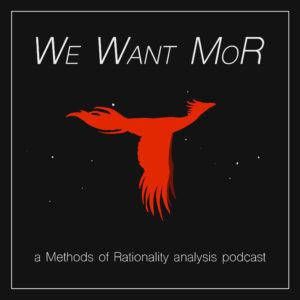
Join Steven and Brian as we dive into the world of Harry Potter and the Methods of Rationality! Steven will play the role of the tour guide while doing his best to not spoil any of the surprises and Brian will play the seasoned adventurer who is new to this particular work.
In this episode, we cover the first five chapters. They’re short and closely tied together. Harry is a scientific polymath and aspiring Rationalist and discovers he’s a wizard, goes shopping, and immediately sets out on the task of figuring out just what the heck is going on in the universe!
Original chapters, written by Eliezer Yudkowsky, can be read here and the audiobook chapters, recorded by Eneasz Brodski, can be found earlier in this podcast feed and on the website.
In next week’s episode, we will be covering chapter 6.
Album art courtesy of Lorec from The Bayesian Conspiracy podcast’s Discord. Thank you!
Coy on the same Discord manages an RSS feed that compiles the relevant audiobook chapters with the WW MoR counterparts. Just copy and paste that link into your favorite podcast app in the “add by url” option. Thanks, Coy!
Podcast: Play in new window | Download | Embed
Subscribe: RSS



 RSS – All Posts
RSS – All Posts Stitcher Smart Radio
Stitcher Smart Radio Google Play
Google Play

You know it’s really interesting about this to me is that the two of you read this story as adults, but I and my two younger siblings all read this as teenagers.
So there’s like a whole lot of explaining stuff that happens in a way that it would often happen in a book aimed at kids, but since your adult and the book here is a med adults it feels dumb or mansplain e as you put it.
Like a lot of these Concepts were absolutely new to me and my siblings cuz we went to public school and grew up in the boonies, most of our family did trade work, so this stuff was really interesting to us and yeah it’s like any TV show that tries to teach you math and science.
Harry going into the physics jargon is because he’s confused and upset and using the jargon is easier than putting it into simple terms. That’s why the jargon exists, because it’s easier to talk about those concepts with specialized words. Idiots think scientists use complicated words to exclude people, because that’s what religion uses them for. But Scientists WANT people to know their tricks and secrets.
I notice you guys didn’t mention the couple lines at the beginning starting “Beneath the moonlight…”
Was that skipped intentionally or an oversight?
It’s not really clear to a new reader what that’s supposed to mean and I let Brian guide the conversation so as to not draw his attention to anything significant before the reader might suspect significance. :)
Before I hop into the podcast proper, but after hearing your discussion about Harry’s “little shit”-ness, I want to sort of muddle through my own thoughts on the matter, and this is as good a place as any to put them out into the world.
I think you guys have a pretty good grasp on what makes Harry’s behavior so divisive, but I think you’re maybe being a bit too generous to him? The way he talks is above his social station, yes, and that makes people uncomfortable, but it’s more than that. I like to think of him as being a half-adult. Sometimes he acts like one, but sometimes, he doesn’t. He’s this weird, confused blend of childishness and maturity that makes him really off-putting to the people around him.
As someone who works with eleven-year-olds all the time, I can tell you that the using big words you maybe understand to confuse people around you is absolutely in-line with a certain type of child his age, and was never hard for me to believe. Him being as well-read as he is at eleven is the biggest leap, tbh.
I think when reading this book, it’s important to remember that while Harry is absolutely a strange, unusually mature-sounding (on the surface,) and intelligent eleven-year-old, he IS still an eleven-year-old, and if you get annoyed by him, that’s probably realistic. Eleven-year-olds are annoying.